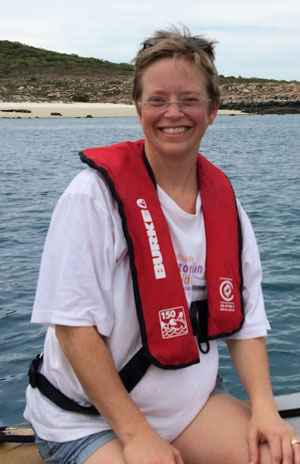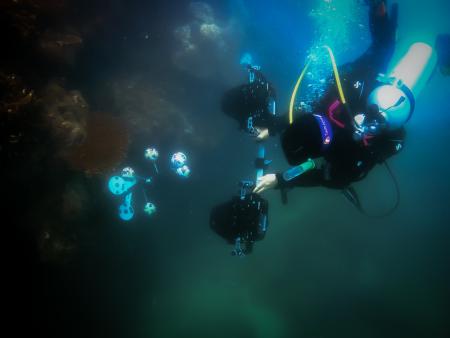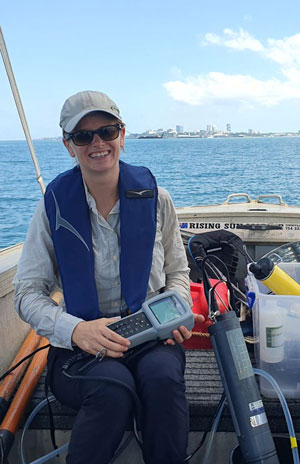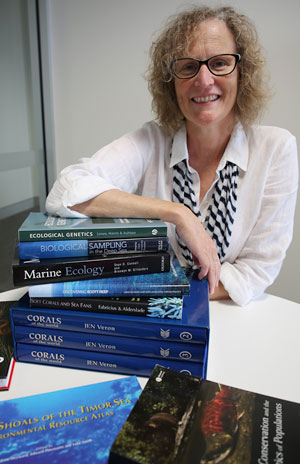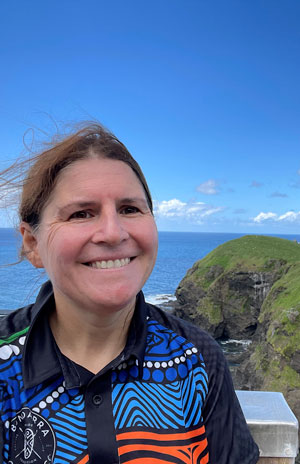To celebrate International Day of Women and Girls in Science, we asked five of our scientists about their role at AIMS, and the rewards and challenges of being a woman in science.
Recently, the Australian Institute of Marine Science was recognised for our efforts in gender equity and diversity in the workplace with the internationally recognised Athena SWAN Institutional Bronze Award. The honour is evidence of AIMS’ commitment to advancing the careers of women in the STEMM disciplines of science, technology, engineering, maths and medicine.
Dr Marji Puotinen | Spatial – Ecological Data Scientist | Perth
Who are you and what is your role at AIMS?
I am a ‘spatial – ecological data scientist’ working in the Perth office at AIMS. I am a geographer thrilled to work with loads of marine biologists and ecologists – helping them design field surveys to get maximum value data for the cost and using that data to ‘fill in the gaps’. I also reconstruct past and future spatial and temporal trajectories of tropical cyclone impacts on coral reefs. I sometimes teach people of all ages about this by wearing a coral polyp costumes where the audience can help me ‘bleach’ by removing my photosynthetic algae partner (zooxanthellae – included on the costume as coloured fabric that can be ripped off and put back on) and help me ‘recover’ once the water cools off by putting it back. I am very excited now to be working as part of the Reef Restoration and Adaptation Program, helping to spatially prioritise conservation of reefs.
Why did you become a scientist?
I come from a family of ‘nerds’! My dad has a PhD and two masters degrees, my mum had two undergraduate degrees, my older sister has a masters degree and my little sister has a PhD. As a little girl, I used to love climbing trees, exploring fields of wildflowers, riding my bike and asking a million questions about everything – science was a natural place for me to be. In my third year of university, I went on a study tour of central and South America – I camped for the first time in a tent on the beach, snorkeled on my first coral reef, saw sea turtles lay eggs on a black sand beach and hiked through rainforests that ended by the ocean’s edge. This awakened a passion to work on coastal and marine ecosystems, which I studied for my masters and then PhD.
What would you say to young girls and women thinking about a career in science?
Ask yourself what is it that you ‘can’t not do’? What inspires you, makes you feel alive and engaged and excited to get up in the morning? If that is science, then don’t let anything stop you! Ask for help and encouragement and never doubt that you are good enough and that you can do it!
How can we encourage girls to get into science?
Show girls that women are in science and haven’t given up their true selves to be there. Change society so that women don’t disproportionately bear the housework and child rearing duties – so that women don’t have to make a choice between family and a science careers. Make the academic workplace family friendly so that women with children can attend meetings but still pick their kids up from school. Promote and reward work-life balance and a rational workload for all. Celebrate both male and female role models in science, working in all kinds of creative and different ways.
What’s the best thing/moment about being a scientist?
I find it immensely satisfying to apply my mind to a problem solving challenge and then to communicate what I find out to people of all ages and backgrounds and to see those findings help make the world a better place. After all, that is what science is for. And science has taken me to incredible places like the Great Barrier Reef, the Amazon rainforest, agricultural fields in SE Asia, remote reefs offshore from NW Australia and even Antarctica!!
Dr Renata Ferrari Legorreta | Ecological Risk Modeller | Townsville
Who are you and what is your role at AIMS?
I am a research scientist in spatial marine ecology at the AIMS, with a focus on understanding and conserving ecosystems into the future. For example, I have developed 3D maps of marine ecosystems to quantify the change in coral reef structure as a result of environmental change impacts. The tools and models I have developed inform management of marine and coastal ecosystems in several countries.
Why did you become a scientist?
Gandhi famously said, “I must be the change I want to see in the world.” I’ve always wanted to see humankind respect nature more than what we actually do. Pursuing a career in conservation biology is the best way I can think of to change the way we see (and respect) nature.
I have always liked the sea, 70% of our planet is marine, and the oceans produce one of every three breaths we take. For some time I thought I wanted to focus on marine mammal science and conservation. Then I realised that you cannot have the birds (or the fish) if you don’t have the forest, and an ecosystem approach seemed better than a species based approach. Of all marine ecosystems, coral reefs are the most diverse, and in my opinion the most beautiful.
What would you say to young girls and women thinking about a career in science?
As M. Gandhi famously said “You may never know what results come of your action, but if you do nothing there will be no result." It is not an easy path, conservation science and practice, often filled with frustrations and big challenges, but if your heart is in it and you don’t give up, you will most likely love it. So don’t be afraid and get out there.
What’s the best thing/moment about being a scientist?
To see my science outputs applied to solve real world problems. For example when I teach other researchers how to create 3D maps of reefs and they use that tech in their own projects, or when I helped the Solitary Islands Marine Park monitoring team to integrate 3D mapping into their research which helped to revise and improve the marine park zoning after 10 years.
Dr Laura Stapp | Technical Officer | Darwin
What is your role at AIMS?
At AIMS, I work as a Technical Officer in the Darwin Team. My role supports the ecotoxicological work that we are doing, which involves running toxicity tests of various compounds and effluents on model organisms in the lab and maintaining our brood stock in the aquarium.
Why did you become a scientist?
Since I was a young girl I was interested in animals and the natural world around me. This curiosity about the natural world did not fade during high school and biology was always the subject I enjoyed most at school. Studying biology was therefore the logical consequence; a decision I never regretted.
What would you say to young girls and women thinking about a career in science?
I would recommend them to do what they are passionate about while also trying to keep an open mind. I think it is also important to find good mentors and to get as much hands-on experience outside of Uni as possible. Be proactive and don’t give up!
How can we encourage girls to get into science?
I think it is important to engage young girls in doing science as early as possible. For example, my dad was a chemistry teacher and would sometimes do small science experiments with us at home. I think this helped to spark my interest in science while also giving me some confidence that I can DO science. So, I think letting girls DO science rather than just talking about it will help them to become more confident in their abilities and will help to overcome gender stereotypes.
What’s the best thing/moment about being a scientist?
I think the best thing about being a scientist is that you never stop learning. You get to see and work in cool places which you would not be able to in a “normal” job, as well as being able to meet great people from all over the world.
Dr Karen Miller | Marine Ecologist | WA
Who are you and what is your role at AIMS?
I am a marine ecologist – I initially started my career studying corals on the Great Barrier Reef and have since worked on corals and other benthic invertebrates as far south as Antarctic and from shallow coral reefs to the deep sea. My role now at AIMS is as the Research Program Director for AIMS in Western Australia.
Why did you become a scientist?
I always loved animals and the love of the natural environment has been the main driver for my career choices. Why marine? In the end it was a serendipitous opportunity associated with allergies of domestic animals (so vet science was impractical!), enjoying learning to scuba dive and an opportunity to visit the Great Barrier Reef – which just blew me away!
What would you say to young girls and women thinking about a career in science?
Follow your passion – don’t feel constrained by what others think you should do or become (if I’d done that, I’d be an accountant running the family business!). If you love what you do, it will never feel like work and going that extra mile to realise an opportunity will be worth it.
How can we encourage girls to get into science?
I think being exposed to role models is really important – it shows us that we can do anything if we try – so thanks for the opportunity to provide that for upcoming female marine scientists through this forum!
What’s the best thing/moment about being a scientist?
My role now is more about facilitating science opportunities for others. At the moment one of the most rewarding things for me is being able to help AIMS scientists realise research opportunities that provide knowledge to help us manage and conserve our marine ecosystems.
Dr Barbara Robson | Biogeochemical Modeller | Townsville
Who are you and what is your role at AIMS?
I am a biogeochemical modeller, which means that I use computer simulations to better understand water quality and how it affects marine ecosystems. I use models to predict what will happen to water quality in the Great Barrier Reef if things change – for instance, if we try different management interventions or in different climate change futures.
Why did you become a scientist?
I first decided that I wanted to be a scientist when I was about five years old, watching David Attenborough documentaries. I loved nature and learning more about how ecosystems work. I changed my mind a few times before finishing school, but I am glad that I came back to science.
What would you say to young girls and women thinking about a career in science?
Science is a great career choice. There are not many other careers that give you so much autonomy, so much opportunity to see the world and make a contribution, or so many bright and interesting people to work with.
How can we encourage girls to get into science?
Girls do get into science in high numbers. The problem is that young women often leave science early in their careers (this is more true in some fields than others – women are very well represented in marine science). To change this, we need to keep doing more to overcome implicit biases and career hurdles for parents who are primary careers for their children (or who are assumed to be so).
What’s the best thing/moment about being a scientist?
I am always learning new things and sometimes help to discover things that nobody knew before.


